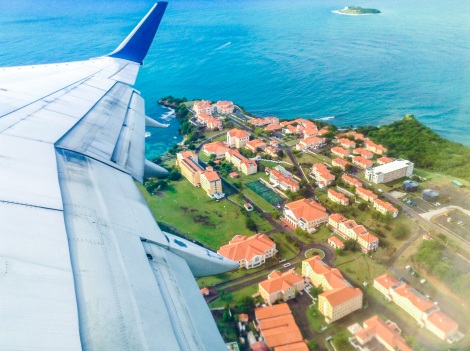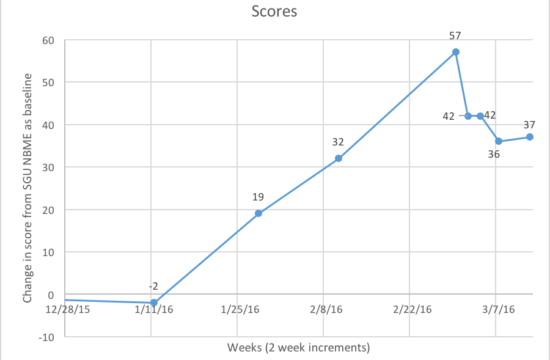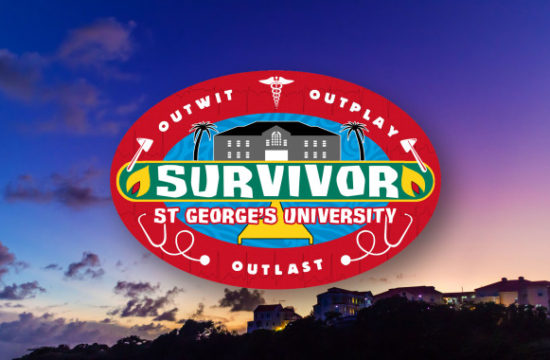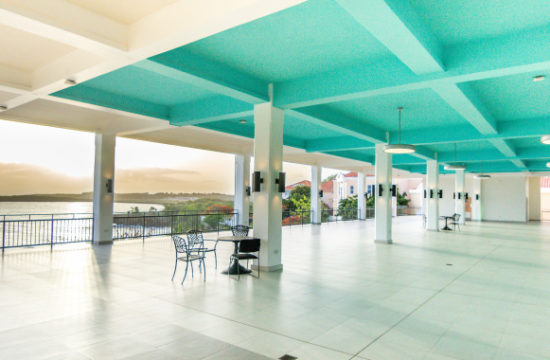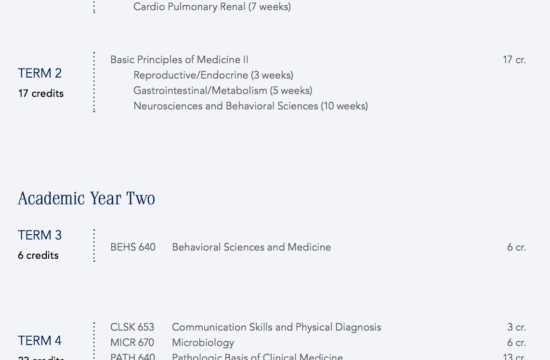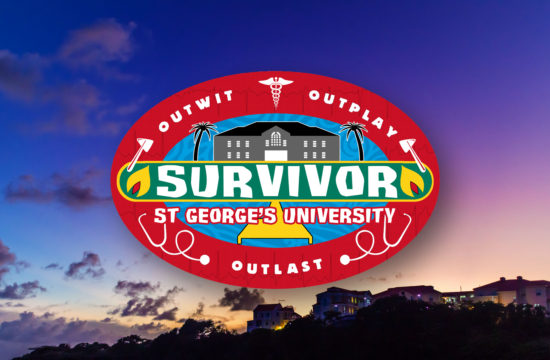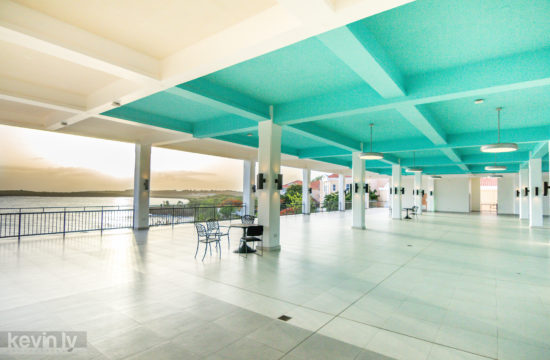Term 1 Complete – 1/8th doctor!
***IF YOU ARE ENTERING after AUGUST 2016 – READ THIS ALSO***
Before I start, this is the best and probably most useless advice you’ll hear. Do NOT trust anything upper termers say, including me. Anything you hear from now on during your time at SGU was all specific to the people in their respective terms. Courses change and it is very unlikely your experiences will be exactly the same if at all. For our term, we were told by upper termers certain courses were easier than others and for our term, course directors changed and people writing the exams changed so the difficulty of the midterm and finals were drastically different from the term prior to ours. Please keep that in mind.
With that being said though, let me share you my experiences, academic, social and general island living.
Academics
Coursework
Term 1 consists of 3 courses in this order of importance: Anatomy, Biochemistry, Histology. Course materials/notes are all posted on Sakai, accessible with your student ID/login.
Anatomy. For me, this course was simply hard because I’ve never taken anatomy courses so most of the terminology was new. Muscles I’ve never heard of, nerves I’ve never heard of etc. As much as I wish this was a “learning to understand” course, there is a massive amount of memorizing that goes into Term 1 anatomy. You need to learn the terminology before you can learn how the muscle groups work together in order to achieve certain actions. To do well in anatomy at SGU, definitely go through the Gray’s Review Book questions at least 3 times before the exams. This sounds silly because there are anywhere between 60-200 questions per section but if you split them up 10-20 questions a day consistently, you can easily get through them at least twice if not three times comfortably. Netter’s is useful for studying the anatomy visually however THERE IS MORE THAN YOU NEED TO KNOW. DO NOT get overwhelmed by thinking you need to memorize this atlas. If anything, use the Gray’s textbook to help guide yourself through the notes rather than Netter’s. I personally used Netter’s alongside the lecture notes (to know the extent of what I need to know) and then repeated Gray’s Review questions. By doing the questions and understanding each answer choice, you are forcing yourself to learn all the potential ways a question can be asked and how each muscle is related to each action and how each nerve can affect different muscles. (You’ll understand this when you start doing it). Note that this is not the same as memorizing answers. Outside of lecture, you have lab days which are 7:40a-12p once a week so expect another 4 hour block of time to be occupied in your schedule outside the standard lecture times. You have 1 hour wet lab which is where you can see cadavers and point out structures in groups of 4. Next, you’ll have 1 hour virtual ‘dry’ lab which is where you go through images …aka x-rays, CTs, etc as well as a short 5 question quiz. This quiz IS SERIOUS. Try to get 4-5 points each week. It’s worth a significant amount of your grade so DO NOT brush this off. You will be given images ahead of time to study from. You also get an opportunity to do ultrasound for about 20mins each week with clinical tutors. Lastly, you’ll have 2 hours of small group discussion where you discuss a journal article you would have read ahead of time, go through a series of discussion questions, and a short 2 question quiz worth 1 point total for the day. These aren’t as serious as the virtual image quiz but they do count also and any points are appreciated for your final grade. Take any quiz seriously.
Biochemistry. Most people’s most difficult course. It is absolutely the most fair of the exams meaning anything that is listed in the lecture notes is fair game and anything that’s not will not be tested. Go through the course objectives and lecture notes and you’ll be fine. Any other resources should be to help guide you through these two. Don’t waste your time learning more than you need to know. I personally didn’t use course objectives but I was able to answer them if they were given to me. The questions on the exam is fair so they don’t try to trick you. Again, most straightforward of the three exams so just study hard and you’ll be fine. You also have 1 hour of small group which consists of a case study discussion. These aren’t graded as harshly as anatomy so just show up and know what you’re talking about and you’ll be fine.
Histology. Oh you poor thing. This class repeatedly, term after term, time and time again, gets left till the night before the exam as everyone madly scrambles to cram for the exams. It’s not the easiest thing to study…just the least important of the 3. HOWEVER, the exam has gotten significantly more difficult recently. Our term was in a bit of shock for the midterm because we weren’t expecting a hard exam (as upper terms told us) but the exam changed significantly and most people left thinking they did poorly. Grades were still average but it was definitely a good scare. How do you study for histology? Pay attention in LAB. You should prepare for your 2 hours of small group discussion by going through the slides given to you before hand, labeling and knowing as much about these slides as possible (stain used, where in the body, types of cells found). You’ll get the hang of it. Just prepare well for these and the rest of the studying/content just falls into place. I honestly don’t know what more to tell you. This shouldn’t be the most of your worries though.
Time management
Time I used split up pre-midterm: Mostly anatomy (4-5 hours), a little biochem every day(2-3), histology a little the two nights leading up to lab days. ….In hindsight, this is what I should have done. 3-4 hours of anatomy, 2 hours of biochem, 1 hour of histology a night. Sounds crazy but that should take you from 6p-12a which isn’t unreasonable at all.
For post midterm, I was trying to recover from mediocre grades so I changed it up. I did about an hour of studying for each lecture we had that day and then an additional 2 hours for the areas I felt I needed more time on or reviewed old material (drugs, diseases, clinical correlates etc). I did significantly better on my finals so perhaps this was a better strategy.
General notes for any class. Look at the syllabus to see where your points are coming from. This isn’t to cut corners. It’s so you use your time towards things that count. Time is limited in med school. You have to be efficient and smart about where it’s allotted. Also, this is medical school. We are being trained to be in the medical field meaning all clinical correlates are RELEVANT…if not now, at some point in the next 2 years. Learn it now. If you see a drug, disease, or anything clinically relevant, it will likely come up on the exam. Mostly all the questions on all the exams are phrased as clinical vignettes so if there’s a clinical term, phrase or anything, make the connection to the topic because likely it will show up on the exam as part of the vignette and then the question stem will be asking about the mechanism, muscle/nerve involved or drug. You get the point.
Other things to consider. Pre-reading. It’s something no one ever really did in undergrad. You spend about 15-30 minutes looking at the lectures ahead of time (night before). I tried this but I felt it wasn’t efficient enough to fit in my schedule. Do try it though. People who did it properly did really well in the courses. I just haven’t personally figured it out yet. For anatomy, I would work through a system at a time going through the Netter’s atlas and eventually in the end it just fit together. The course goes through integrating all the parts at once so that was too much for me to learn at once. For biochemistry, you can look at the pathways ahead of time and the details will fall into place on its own. For histology, I never got time to even try prereading. Most of it was basic knowledge and it came down to you integrating that to microscopic slides.
Grades and Not doing well
If you don’t do well on your first exam, unifieds, DO NOT FREAK OUT. You can recover. Take an appointment with DES and a learning strategist to figure out how to improve and change your habits for midterms. If you don’t do well on midterms, definitely see your advisor and the course directors. You need a 73 average in all three courses and a 70 to pass each course so by not doing well, I mean anything failing ( <70). I was significantly below this threshold for all three courses after midterms and was told to decel at least one if not two of my courses. The terminology is a bit confusing because there’s IAP which is individual advancement program? and I think it’s the same but I’m not sure. ANYWAY, you drop a course so you can dedicate your time to the other course(s) with the hope that you will do better with more time dedicated toward them.
I personally did not decel even though it was strongly recommended that I do. I wasn’t trying to undermine the advice of the course directors or test the system. I just knew what I was capable with. HOWEVER. If I had to do it again, I would not recommend following in my footsteps. It was emotionally draining, not knowing when your last day will be and I would have rather stayed another term and retake the course(s) and do better in the end since I already knew half the material and could therefore score higher and get higher final grades. Now I have to do significantly better in term 2 to bring up my average BUT I’m in term 2. It’s a tradeoff. The course directors will not make the decision for you so it’s up to you and whether or not you think you can handle it. Again, my approach was risky, mentally taxing, and not recommended but I am proof that it is possible if you choose to do so.
Exam conditions
Remember taking MCATs either at Prometric or one of those high security testing facilities? That’s what taking a midterm or final feels like here. SGU uses examsoft, an electronic exam software that is run on your own laptops. You can only bring an ethernet cord, power cable and your laptop to the exam site (a lecture hall on campus). That an your ID and clear water bottle. Not watches, wallets, drinks, etc. Thing to take away from this: have a reliable laptop with you and test the software before exam day.
Day to day life
Other than studying? ….haha just kidding.
Most of your free time is on weekends and perhaps an hour a day if you plan it out right however you’ll feel the need to study instead closer to exam weeks. There are people who study on the beach in Grand Anse, a 10 minute bus ride away to the other SGU campus or even on the dock on campus if you’re into multitasking sunbathing and reading about how the sun can give you skin cancer.
Note: For any of the SGU buses, all you need is a student ID.
Fun stuff
Bananas. No, not the ones you eat. There’s a place down the street from campus called Bananas and it’s basically the local hangout spot for most students. It’s not your typical NYC nightclub but it’s as close as you’re going to get to a bar/club that’s walking distance.
For food, there’s tons of great places off campus. I’m not entirely convinced that eating on campus and off campus is significantly cheaper or more expensive. They feel the same but the variety off campus is a lot better. By off campus, I mean 5 minute walk…just for reference. Options is a place that’s… a collection of different dining options…basically food shacks. You have ice cream, sandwiches, platters, dinner plates, vegetarian stuff. That and on campus you have Subway, NY Bagels which sells bagels, sandwiches, pizza, coffee and other fried stuff like fries and also chicken and eggs and cheesecake…that should cover most of your food requirements.
A lot of people also cook so IGA is the closest grocery/supermarket. It’s 10 minutes on the same bus to the SGU Grand Anse campus. Expect the prices to be higher but you just get used to it. IGA has everything you need and if not, there’s a hardware store next door that will have what IGA doesn’t. Brands are not as limited as people in other blogs make it sound. I’ve found every brand I’m used to but maybe I’ve never been too picky. There is also Food Faire and CK’s two other places to get food/shop for groceries but I personally don’t shop there. Both places are apparently cheaper but variety is more limited. For reference, most people I talk to have spent around $1500-2500 USD on food and daily supplies etc. It’s a wide range but some people decided to ship stuff down or use parents as luggage mules while others built inventory up once they got here. I only brought down 2 bags of luggage for clothes and bed/school supplies. The rest, I bought down here (hangers and toiletries). I didn’t find the prices to be significantly higher and I ended up just spending the money I saved instead of checking in a 3rd bag. Personal preference. I don’t think either way is better than the other. If you’re shipping a barrel down, I would think that’s the only thing that makes it worth it. I haven’t shipped one so I can’t comment on that. Not many of my friends shipped stuff down either.
It’s going to be hard to find or convince yourself to have fun while you’re here especially if you fall behind or struggle in your coursework but trust me, you can have fun while doing well. In the second half of the term, I was forced to work non stop but I forced myself to go see the island for brief amounts of time not knowing if it was my last term here. I don’t regret it and I actually did a lot better than when I locked myself in trying to study nonstop before midterms. Definitely buy the pass from the Student Government Association for the events throughout the term. It comes out to be cheaper than paying for events separately AND it forces you to have fun for the 4 or so nights at the big events each term. They try to plan it around the exam schedules so you won’t be partying a night before and exam. I’ve gone to most of the nice resorts and clubs that way.
Also, if you get on the island early, explore the island with a few other 1st termers or meet up with an upper termer and have them show you around. The island is a lot bigger than you think and the people are really nice. Just travel in groups, it’s safer and cheaper.
Places you must go before leaving after term 1.
Grand Anse Beach, Bananas, St. George’s (the city) …at the very least, make sure you go to the beach. please. You’re on an island, it’s not asking for a lot.
Clothes and other stuff to bring
It’s hot and humid outside. I would say consistently 84 degrees and 84% humidity. If you think that’s an arbitrary number, you’d be surprised because it was actually 84 consistently for about 3 weeks straight for some reason. It rains during rainy season at least once a day for 20 minutes. Surprise. If you’re coming in the January term, that should be slowing down as we reach the drier months. Summer clothes regardless. LECTURE HALLS ARE NOT ISLAND LIKE. Most lecture halls are trying to simulate winter in the northeast US. I can confidently say some of the lecture halls hit the 40s F last month. Bring a sweatshirt or two with you. If your parents or loved ones give you a hard time for bringing winter clothes to an island, ignore them. Bring some warm clothes and warm bed sheets. AC in the dorms are…extreme. You have control over them but you’ll basically be forced to keep it cold to avoid the mold from growing if left in warm humid temperatures.
Technology
The school has both US and European outlets. You can bring an adapter but you’ll be fine with just US. All lecture halls are US outlets. Most people bring laptop, tablet, smartphone (unlocked). The two phone carriers are Digicel and Lime. I haven’t seen one being better than the other. Most people just use Facebook messenger anyway so you won’t pay much for the phone other than emergencies or calling for cabs. It’s pay as you go so you pay for credit on your line and then that gets deducted per call or per text. You can buy data plans but the data service is barely 3G on the island so I wouldn’t waste any money on it. I have another post on the phones here. Also, definitely bring a camera if your phone or smartphone doesn’t have a decent on it. You’ll want to take pictures of the sunsets and beaches. iPhones do get stolen or lost quite often so just be careful but that happens everywhere you go. Just know that if it gets stolen here, it’s likely never to be found again. If it’s lost though, you may have a chance because most students here are nice enough to return it by posting “found iphone” messages on your respective Facebook groups. There is also a lost and found through the security office at the school.
Facebook!… is used by the administration. Careful what you post. SGU uses Facebook significantly from groups to organizations all the way up to Class of ‘xy. You’ll find it comes in handy so I wouldn’t hesitate to make one if only to keep up with things going on especially people in your term trying to meet up when you all first get on the island.
—–
I think that covers enough to get your up to speed on what to expect for Term 1 and the transition onto the island. I’ll make edits and add more as I see fit and if I’m missing something important, comment below!

